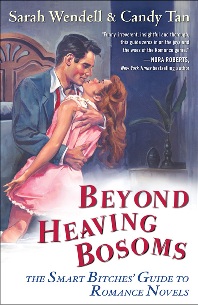I’m doing something a little different here this week. Those of you who’ve followed my posts here for a while know that I have a tendency to rant write about the “ghetto” of science fiction, whether it’s perceived or real, and how much of it is self-created. Well, today I’m mixing things up and interviewing a representative from the neighboring ghetto of Romance fiction. Sarah Wendell is one half of the Smart Bitches at smartbitchestrashybooks.com, and co-author (with fellow Smart Bitch, Candy Tan) of Beyond Heaving Bosoms: The Smart Bitches’ Guide to Romance Novels. This book is not only a wickedly fun read, but it also gives interesting and thought-provoking insights into the history, the tropes, the future, and the shame of Romance. (I dare anyone who has ever dismissed Romance as being formulaic or shallow to give this book a read. I can definitely say that my eyes were opened on a number of topics!)
DR: Thank you so much for taking the time to answer a few questions for me! Sales of romance novels dominate the book industry. Why do you think it’s such a huge market?
SW: Courtships stories have been part of narrative tradition since someone decided it might be a good idea to have a narrative tradition. It’s the most consistent drama humans face that is most often happy – attraction, arousal, allure, and the commitment that may follow are intensely powerful events for people, no matter how blasé or cool they might seem. So reading about that experience and knowing that it ends happily is a consistent element of storytelling. Plus, just about every other fictional narrative contains a romance element. Whether romance is the main focus or an ancillary element, like Prego, it’s in there.
DR: I’ve blogged before about science fiction and fantasy being a “ghetto” of sorts. Do you think that romance is also a ghetto, albeit a much larger one?
SW: As Candy said in this blog post at Powells: http://www.powells.com/blog/?p=5980
…it’s the genre ghetto’s genre ghetto. Romance is the country music of literature: “at least I don’t like romance novels” will justify admiration of anything that skirts the line of questionable taste.
DR: There are many genre readers who will never venture near the romance section of the bookstore, even though they will gladly pick up books in the SF/F section that clearly have romantic subplots. Is there anything you could think to say to these people to encourage them to dip their toes in the romance pool?
SW: Three words: Lois McMaster Bujold. She will lead you to the light and the truth that the romance, it kicks the ass. From there, the world is your throbbing pink oyster.
DR: There’s a pervasive view that romance readers are just bored housewives, and science fiction/fantasy readers are nerds who live in their mother’s garage. Why do you think these stereotypes still persist even when the genres have clearly moved beyond them?
SW: I think deep down we carry high school with us, and are often afraid of being permanently labeled “uncool” or being marginalized because we enjoy something off-beat and different. It’s easier to stick with stereotypes than actually ponder the nuances and sophisticated elements at work in your average science fiction/fantasy novel, or romance novel.
DR: How has romance embraced concepts that are near and dear to science fiction and fantasy fans? Are you seeing more crossover?
SW: Oh yessssss. Urban fantasy is often a neat blend of two or all three, as are many of the steampunk novels being published. Just about every sci fi or fantasy novel incorporates some romantic elements, even if there’s no happy ever after for the protagonists — the three are very much intertwined.
DR: Why do you think paranormal romance and urban fantasy have become so popular?
SW: My theory: in a world in which we are constantly reminded of the presence of terror, having a villain who is readily identifiable (hairy in moonlight? Driven to commit acts of exsanguination?) and either vanquished by emotional affirmation or utterly and completely decimated is, to put it simply, reassuring. When the villain in the “real world” is unidentifiable, the obvious “other” is captivating in an entirely new way. As for urban fantasy, the reliance on the Kickass Heroine means that a whole new realm of female autonomy, actualization, and sexual agency can be explored, to which I say, HELL TO THE YES.
DR: How do you feel about Cover Shame, i.e. those lurid or obnoxious covers in both romance and sf/f that are almost embarrassing to have?
SW: Neither the authors nor the readers are responsible, and anything that is THAT absurd is epic comedy win.
DR: You have a book! What do you think Beyond Heaving Bosoms can offer people who are not already readers of romance?
SW: The Bosoms? Creative uses of the word “cuntmonkey.” Examinations of what makes a romance novel cover Extra More Gooder.
Seriously: It’s a guide for anyone who loves romance and is tired of taking crap for it, and for anyone who has ever wondered, “What is it about romance novels?” Since, as I mentioned, every fictional narrative contains romantic elements, the appeal is not exclusive, and neither is our book.

Thanks again to Sarah Wendell for stopping in at the Magic District!









